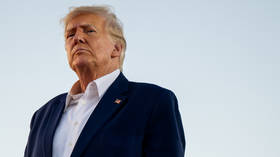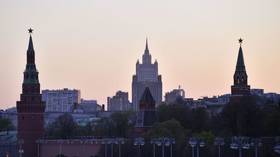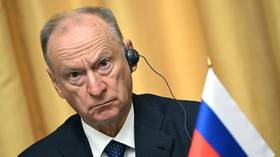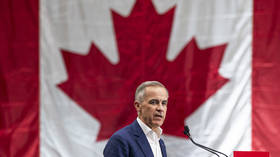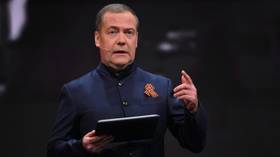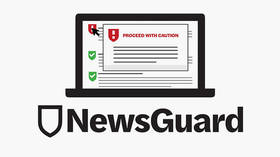Alliance life after ‘brain death’: NATO focuses on outer space, compares army spending with Russia
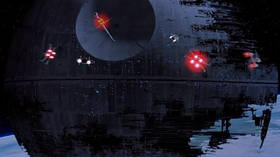
Though most members can barely afford to cough up their required military spending, and with European leaders questioning the venerable alliance, why is NATO Secretary General Jens Stoltenberg talking about expanding into space?
Jens Stoltenberg is an unlikely Darth Vader. Beginning his political career with left-wing protests against the Vietnam war, Stoltenberg would go on to join the machine he once railed against, overseeing an expansion of Norway’s military while Prime Minister from 2005 to 2013, and then leading the world’s largest military alliance from 2014 onwards.
But his ambitions are galactic, at least if his own words are anything to go on. Speaking to reporters at a NATO meeting in Brussels on Tuesday, the alliance leader announced plans to make outer space one of its ‘operational domains,’ alongside land, sea, air, and cyber.
Also on rt.com No country is sending weapons into orbit now, but ‘militarization of space is only matter of time’“Space is of great importance for our civilian societies and for any military operation,” he said. “It’s about communications, it’s about navigation, it’s about data imagery. Space is essential for almost everything we do.”
Straight off the bat, the announcement opened up more questions than it answered.
“It’s interesting to talk about,” former Pentagon official Michael Maloof told RT, “wanting to expand the domain of NATO into space, but what does this mean? Nobody knows. And who pays for it? [Most NATO countries] can’t even afford to keep up their two percent [military spending commitment].”
“I don’t know which country other than the United States at this point would be in an economic position to come forward and foot the bill,” Maloof added.
A new space race
Within the alliance, individual states are already jockeying to lead the space race, namely the United States and France, with the US the frontrunner. The US already owns around 900 of the 2000 or so satellites orbiting the earth. Only another 200 or thereabouts are owned by other NATO countries. In addition, the Pentagon has already formally established the US Space Command, a command under the Air Force that may become a full-fledged Space Force if Congress passes the upcoming National Defense Authorization Act.
Also on rt.com ‘Ultimate high ground’: Pentagon launches US Space Command, crosses fingers for Space ForceNot wanting to miss out on the action, French President Emmanuel Macron announced the creation of his own space command in July. The announcement fitted in with the French leader’s cocksure EU-first brand of leadership, exemplified by his calls for an EU army and his criticism of the US-dominated NATO alliance, which he called “brain dead” earlier this month.
Stoltenberg has dismissed Macron’s Napoleonic ambitions. “European unity cannot replace Transatlantic unity as we need both,” he told reporters on Tuesday, adding that more than 80 percent of the alliance’s funding comes from “non-EU allies,” read: America. Military expansion in space would therefore be no less American-led.
“France has the strongest capabilities in this regard among other NATO members. But it’s all about the United States as they try to monopolize [militarization of space] and employ their own weapons,” Konstantin Sokolov, geopolitics expert and research fellow with Russia’s Academy of Natural Sciences, told RT.
“It is worth recalling that the United States, which has a large fleet of reconnaissance satellites, is the key NATO member that sets the tone for its activities,” SPACE industry analyst Leonid Khazanov added.
Also on rt.com ‘EU can’t defend Europe’: Stoltenberg takes aim at Macron’s ‘brain-dead’ NATOStoltenberg described NATO’s planned space operations as a purely “defensive” step, and stressed that he has no intention of putting offensive weapons in space. Washington sings a different tune, however.
Offensive moves
“Space is a warfighting domain, just like air, land and sea,” Space Command head Gen. John Raymond said on Monday, building on earlier comments from former Pentagon Chief Jim Mattis, who called for the development of offensive weapons in space “should someone decide to militarize it.” Indeed the branch’s stated goal is to “degrade, deny, disrupt, destroy, and manipulate adversary capabilities to protect US interests, assets, and way of life” - hardly defensive words. Russia and China - both of whom are working on their own anti-satellite weapons - have criticized the US for its steps toward the militarization of space.
Any nation that sends a satellite to space risks militarizing the skies, Hall Gardner, professor and author of ‘World War Trump’ told RT, “given the fact that satellites possess dual use civilian, espionage, cyber-warfare and military purposes.” However, the US shredding of arms control treaties - like George W. Bush’s withdrawal from the 1972 ABM treaty in 2001, and Donald Trump’s withdrawal from the 1987 INF treaty earlier this year, makes the weaponization of space inevitable, Gardner added.
Also on rt.com US paving way for ‘full-scale arms race’ by staying silent on Russia’s New START proposals – Putin“The possibility that Washington and Moscow could permit the New START accord to expire in February 2021 would mean no constraints on nuclear-capable ICBMs―and would indirectly open the door to new first strike weapons deployments on land, sea, in the air and in outer space.”
Macron has already questioned Trump’s willingness to defend Europe. But how would European leaders feel about defending the United States if one of its satellites were shot down? That’s a hypothetical question though, and NATO’s concerns are likely more down-to-earth at the moment.
A fracturing alliance
Stoltenberg’s opening up of the stratosphere is “a desperate call,” Maloof told RT. “He didn’t have any details of how this thing would be implemented, who will pay for it, how it will be accomplished. It would be an interesting thing just to hear what his plan is.”
Rather, NATO needs to press member states to cough up more money, while simultaneously keeping the US and France on side. Turkey, a NATO member, is already purchasing Russian weaponry against alliance advice, and a host of countries around the world, including Italy, have signed on to China’s Belt and Road Initiative. On the eve of NATO’s 75th birthday, Stoltenberg’s single biggest challenge is keeping the alliance relevant in a post-Cold War world.
Also on rt.com NATO’s ‘free-rider problem’: Macron wants independent Europe, but ‘it’s not something he can change JUST LIKE THAT’To that effect, the NATO chief attempted to justify the bloc’s enormous combined military budget - 20 times that of Russia - to reporters on Tuesday. The massive expenditure, he argued, is not a holdover from the Cold War, but purely a reflection on the difference in “salaries” and the “higher standard of living” in the Western world.
However, higher military salaries can only account for so much of NATO’s expenditure. The alliance ran 106 war-readiness exercises last year, compared to a handful by Russia. Moreover, some 22,000 NATO personnel are currently engaged in operations around the world, and the United States alone officially maintains more than 500 bases in over 80 countries, compared to 21 Russian installations in nine countries. France and Britain too operate bases in 11 foreign lands each, adding to NATO’s costly tally.
White elephant space projects and drumming up the threat posed by Russia are the moves of an alliance “on a respirator,” Maloof concluded.
“It’s Stoltenberg grasping at straws to try and preserve an archaic alliance,” he said. “It’s past its due now. Its time has passed.”
Think your friends would be interested? Share this story!



